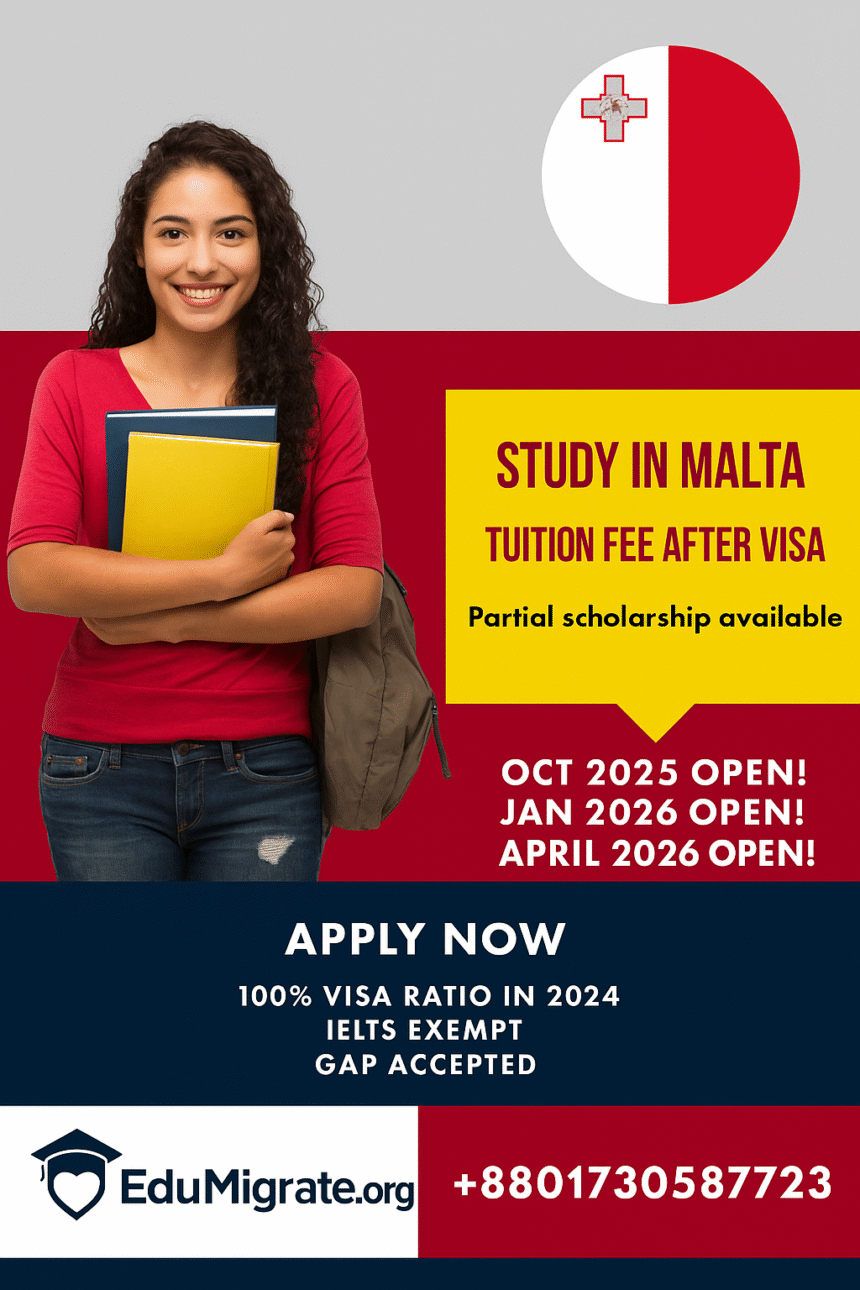Malta, a picturesque island nation in the Mediterranean, is rapidly emerging as a favored destination for international students. With its English-speaking environment, affordable education, and vibrant culture, Malta offers a unique blend of academic excellence and enriching experiences.
Why Choose Malta for Higher Education?
- English as an Official Language: English is one of Malta’s official languages, ensuring that international students face no language barriers in academics or daily life.
- Affordable Tuition Fees: Compared to other European countries, Malta offers competitive tuition rates, making quality education accessible.
- Diverse Academic Programs: From humanities to sciences, Maltese institutions provide a wide range of programs catering to various interests.
- Safe and Welcoming Environment: Malta boasts a low crime rate and a hospitable community, ensuring a comfortable stay for students.
- Strategic Location: Situated in the heart of the Mediterranean, Malta offers easy access to other European countries, enhancing travel opportunities.
🏛️ Top Universities in Malta
- University of Malta (UM): Established in 1592, UM is the oldest and most prestigious institution in Malta, offering a plethora of undergraduate and postgraduate programs.
- Malta College of Arts, Science and Technology (MCAST): MCAST provides vocational and professional education, focusing on practical skills and industry relevance.
- American University of Malta (AUM): AUM offers American-style education with programs in business, engineering, and technology.
- Global College Malta (GCM): GCM specializes in business and management courses, emphasizing global perspectives and leadership skills.
- Saint Martin’s Institute of Higher Education: Known for its computing and business programs, the institute collaborates with international universities for degree validation.
Tuition Fees
Tuition fees in Malta vary based on the institution and program:
- University of Malta: €1,500 – €4,000 per year for undergraduate programs.
- MCAST: €2,000 – €5,000 per year, depending on the course.
- Global College Malta: €3,000 – €7,000 per year for business and management programs.
- American University of Malta: €8,000 – €12,000 per year for various undergraduate and graduate programs.
- Saint Martin’s Institute: €2,000 – €4,000 per year for computing and business courses.
🏠 Cost of Living
Malta offers a relatively affordable cost of living compared to other European countries:
- Accommodation: €300 – €700 per month, depending on location and type.
- Food and Groceries: €200 – €350 per month.
- Transportation: €20 – €50 per month for public transport.
- Utilities and Internet: €50 – €100 per month.
- Miscellaneous (entertainment, books, etc.): €100 – €200 per month.
On average, a student should budget approximately €700 – €1,200 monthly, depending on lifestyle and accommodation choices.
🎓 Scholarships and Financial Aid
Several scholarships are available for international students aiming to study in Malta:
- Malta Government Scholarships: Offered for undergraduate, master’s, and Ph.D. programs, covering tuition fees and living expenses.
- Endeavour Scholarships Scheme: Aimed at postgraduate students, this scholarship supports studies in areas crucial to Malta’s development.
- University of Malta Scholarships: Available for research-based master’s and doctoral programs.
- Erasmus+ Program: Facilitates student exchanges and provides financial support for studies within European countries.
- Commonwealth Scholarships: For students from Commonwealth countries, covering tuition and living costs.
🛂 Visa and Work Opportunities
Student Visa:
International students from non-EU countries require a student visa to study in Malta. The application process involves:
- Acceptance letter from a recognized Maltese institution.
- Proof of sufficient funds to cover tuition and living expenses.
- Valid health insurance.
- Accommodation details in Malta.
It’s advisable to apply well in advance, as processing times can vary.
Work Opportunities:
International students are permitted to work part-time (up to 20 hours per week) during their studies. Post-graduation, students can explore job opportunities in Malta, especially in sectors like tourism, finance, and information technology.
Conclusion
Malta stands out as an excellent destination for international students seeking quality education in a serene and culturally rich environment. With its affordable tuition fees, reasonable living costs, and a plethora of scholarship opportunities, Malta provides a conducive atmosphere for academic and personal growth.
For more detailed information and application procedures, you can visit the University of Malta’s official website or explore scholarship options on ScholarshipsAds.







I am not real superb with English but I find this real easy to interpret.